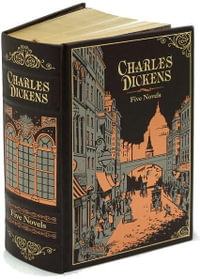'I have made up my mind (with God's leave) to go to America - and to start as soon after Christmas as it will be safe'
So wrote an exuberant Dickens shortly before his voyage to America in 1842. He was the most famous of many travellers of his time who journeyed to the New World, curious to find out about the revolutionary new civilization which had captured the English imagination. His frank, often humorous descriptions cover everything from his comically uncomfortable sea voyage to his wonder at the Niagara Falls.
American Notes can be read as a journey in the long-established tradition of Chaucer, Bunyan or Swift - as a progress to knowledge through varied experiences. Above all, it is a fascinating account of what was for Dickens an illuminating encounter with the New World.
About The Author
One of the grand masters of Victorian literature
Charles Dickens was born at Portsmouth on 7 February 1812, the second of eight children. Dickens's childhood experiences were similar to those depicted in David Copperfield. His father, who was a government clerk, was imprisoned for debt and Dickens was briefly sent to work in a blacking warehouse at the age of twelve.
He received little formal education, but taught himself shorthand and became a reporter of parliamentary debates for the Morning Chronicle. He began to publish sketches in various periodicals, which were subsequently republished as Sketches by Boz. The Pickwick Papers were published in 1836–7 and after a slow start became a publishing phenomenon and Dickens's characters the centre of a popular cult.
Part of the secret of his success was the method of cheap serial publication which Dickens used for all his novels. He began Oliver Twist in 1837, followed by Nicholas Nickleby (1838) and The Old Curiosity Shop (1840–41).After finishing Barnaby Rudge (1841) Dickens set off for America; he went full of enthusiasm for the young republic but, in spite of a triumphant reception, he returned disillusioned. His experiences are recorded in American Notes (1842). Martin Chuzzlewit (1843–4) did not repeat its predecessors' success but this was quickly redressed by the huge popularity of the Christmas Books, of which the first, A Christmas Carol, appeared in 1843.
During 1844–6 Dickens travelled abroad and he began Dombey and Son while in Switzerland. This and David Copperfield (1849–50) were more serious in theme and more carefully planned than his early novels. In later works, such as Bleak House (1853) and Little Dorrit (1857), Dickens's social criticism became more radical and his comedy more savage.
In 1850 Dickens started the weekly periodical Household Words, succeeded in 1859 by All the Year Round; in these he published Hard Times (1854), A Tale of Two Cities (1859) and Great Expectations (1860–61). Dickens's health was failing during the 1860s and the physical strain of the public readings which he began in 1858 hastened his decline, although Our Mutual Friend (1865) retained some of his best comedy.
His last novel, The Mystery of Edwin Drood, was never completed and he died on 9 June 1870. Public grief at his death was considerable and he was buried in the Poets' Corner of Westminster Abbey.
Industry Reviews
This new edition of the early Dickens classic (1842) returns to the stores the first of his two long out-of-print travel books, the other being Pictures From Italy (1846). The editorial improvements are not great but do embody Dickens' own revisions (and restore his excisions). Written at 30, between Barnaby Rudge and The Life and Adventures of Martin Chuzzlewit, and based largely on letters home describing his American experiences, American Notes is not the vitriolic work many Americans first thought it was because of Dickens' opposition to slavery, his surprise at our more graceless habits and description of the widespread practice of spitting, of corruption in the House of Representatives, of the torture and agony of prolonged incarceration in Philadelphia's solitary prison and in Manhattan's stygian Tombs prison, and of the large sows and swine population trotting along Broadway "and mingling with the best society, on an equal, if not superior footing. . . They are the city scavengers, these pigs. Ugly brutes they are; having. . .scanty, brown backs, like the lids of old horsehair trunks: spotted with unwholesome black blotches. . . They are never attended upon, or fed, or driven, or caught, but are thrown upon their own resources in early life, and become preternaturally knowing in consequence. . . At this hour, just as evening is closing in, you will see them roaming towards bed by scores, eating their way to the last." Dickens was also stony towards the American habit of pirating the works of English authors - he knew American Notes would be pirated massively, and called (quite unpopularly) for international copyright laws. And his comments on slavery, and the horrible advertisements identifying runaway slaves, which he reprints, verge on the gruesome and would madden any pro-slaver. He is more kinky about Boston, Hartford, New Haven, Pittsburgh, Cincinnati, about life on the Prairie, the physical beauties of travel by steamboat, and is stunned and rhapsodical about Niagara Falls. In a postscript added in 1868, after a return trip, he comments that he has "been received with unsurpassable politeness, delicacy, sweet temper, hospitality, consideration, and with unsurpassable respect for the privacy daily enforced upon me by the nature of my avocation here, and the state of my health." It was the least we could do for such an invaluable and honest picture of ourselves. (Kirkus Reviews)










































